

Tiny Habits - Behavior Change. How do you stay motivated when you’re not making any money? In the comments for my previous post, two totally different people asked me what appears to be the exact same question: “How’d you get past that initial period when you weren’t making any money?
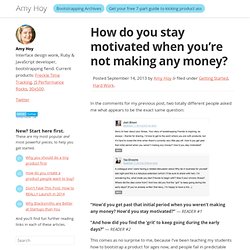
How’d you stay motivated?” — READER #1 “And how did you find the ‘grit’ to keep going during the early days?” — READER #2 This comes as no surprise to me, because I’ve been teaching my students how to bootstrap a product for ages now, and people fail in predictable ways. 14 Revealing Signs You Love Your Startup Job. You may not be frequently giving out an embarrassingly gushing smile and you might not write little love notes during your lunch break.
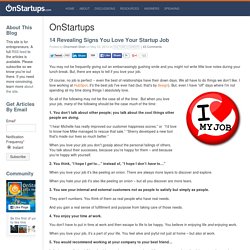
But, there are ways to tell if you love your job. Of course, no job is perfect -- even the best of relationships have their down days. We all have to do things we don’t like. I love working at HubSpot, it's the best job I've ever had (but, that's by design). Founders: You don’t own your employees. [Ed. note: This is in response to a post by David Hauser entitled, "The Startup Side Project Bubble" which you can read here: So many founders forget something simple: You do not own your employees.
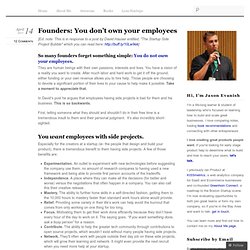
They are human beings with their own passions, interests and lives. Você conhece o perfil dos seus funcionários? Nesses anos de trabalho atuando diretamente com gestão de pessoas, as reclamações mais clássicas que ouço de diretores, gerentes e gestores são relacionadas à comunicação com seus times.
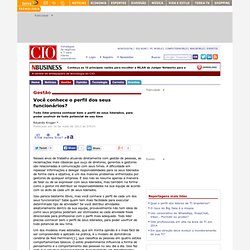
A dificuldade em repassar informações e delegar responsabilidades para os seus liderados de forma clara e objetiva, é um dos maiores problemas enfrentados por gestores de qualquer empresa. E isso não se resume apenas a maneira de falar ou de se expressar com seus liderados, mas também na forma como o gestor irá distribuir as responsabilidades na sua equipe de acordo com os skills de cada um de seus liderados. Isso parece bastante óbvio, mas você conhece o perfil de cada um dos seus funcionários? Sabe quem tem mais facilidade para executar determinado tipo de atividade? Se você distribui atividades aleatoriamente dentro da sua equipe, provavelmente não tem ideia de como seus projetos poderiam ser otimizados se cada atividade fosse direcionada para profissional com o perfil mais adequado. Startup Therapy: Ten questions to ask yourself every month by. In the last post I beat you to death about ditching your business plan but failed to provide an alternative.
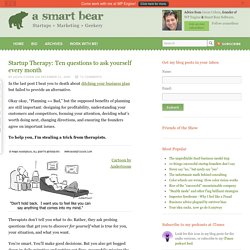
Okay okay, “Planning == Bad,” but the supposed benefits of planning are still important: designing for profitability, understanding your customers and competitors, focusing your attention, deciding what’s worth doing next, changing directions, and ensuring the founders agree on important issues. To help you, I’m stealing a trick from therapists. Cartoon by Andertoons Therapists don’t tell you what to do. Rather, they ask probing questions that get you to discover for yourself what is true for you, your situation, and what you want.
You’re smart. That’s where this article comes in: To splash cold water on your face, forcing you to face reality and continue to defend or change the important choices inside your business. Is Fear Stopping You from Starting a Company? How to Be Happier at Work: 10 Tips.
StrengthsFinder. Keirsey Temperament. Angela Duckworth. Pare de desmotivar seus funcionários. Não falha. Sempre que eu converso com alguém sobre gestão a pergunta acontece: "Como posso motivar a minha equipe? " A maioria das pessoas começa em um novo emprego com a motivação muito alta. Estão empolgados e querem fazer um bom trabalho. Mas, conforme o tempo passa, a motivação acaba. E não é porque os gerentes e diretores falharam em motivar suas equipes. Surpresas na avaliação anual dos funcionários. Microgestão. Críticas públicas. Solicitar um comportamento e recompensar quem não o segue. Metas inatingíveis. Perguntar algo e depois ignorar. Tratamento especial. Frases vazias. Pessoas são custos Quando a redução de custos é sinonimo de redução de pessoal, a mensagem que fica é que pessoas não são investimentos.
Algumas pessoas são mais valorizadas do que outras. Empregados não são confiáveis. Empregados não são capazes de tomar boas decisões. 10 Things I, As a Developer, Wish More Entrepreneurs Knew. A few weeks ago, Stephen Anderson wrote a piece entitled “29 Things I, as a designer, wish more tech startups knew.”
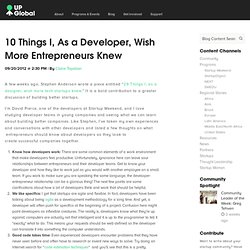
It is a bold contribution to a greater discussion of building better startups. I’m David Pierce, one of the developers at Startup Weekend, and I love studying developer teams in young companies and seeing what we can learn about building better companies. Like Stephen, I’ve taken my own experiences and conversations with other developers and listed a few thoughts on what entrepreneurs should know about developers as they look to create successful companies together. Know how developers work: There are some common elements of a work environment that make developers feel productive. Unfortunately, ignorance here can leave sour relationships between entrepreneurs and their developer teams. Be careful to avoid making your development team feel like “code monkeys.” Sete dicas para retomar o prazer pelo trabalho.